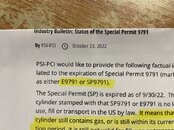You are using an out of date browser. It may not display this or other websites correctly.
You should upgrade or use an alternative browser.
You should upgrade or use an alternative browser.
Here we go again...PST tanks marked E9791/SP9791
- Thread starter Budprop
- Start date
-
- Tags
- hp steel pst scuba tank
Please register or login
Welcome to ScubaBoard, the world's largest scuba diving community. Registration is not required to read the forums, but we encourage you to join. Joining has its benefits and enables you to participate in the discussions.
Benefits of registering include
- Ability to post and comment on topics and discussions.
- A Free photo gallery to share your dive photos with the world.
- You can make this box go away
Eric Sedletzky
Contributor
Just curious, why aren’t LP 3AA tanks subject to a permit renewal like this one?
DeepSeaExplorer
Contributor
Because they are low pressure. The permit is for high pressure tanks. The whole thing is odd.
Appears to be a printout of the the PSI-PCI "special bulletin".I snapped this at my LDS. Unfortunately I didn’t think to photograph the whole thing.

Industry Bulletin: Status of the Special Permit 9791 - DiveNewswire
PSI-PCI would like to provide the following factual information related to the expiration of Special Permit 9791 (marked on cylinders as either E9791 or SP9791). The Special Permit (SP) is expired as of 9/30/22. This means that any cylinder stamped with that SP9791 or E9791 is no longer valid...
- Messages
- 14,188
- Reaction score
- 11,447
- Location
- Port Orchard, Washington State
- # of dives
- 1000 - 2499
PST SP 9791 cylinders have never been legal to fill or hydro in Canada.Does anyone know if these tanks can still be filled in Canada?
- Messages
- 14,188
- Reaction score
- 11,447
- Location
- Port Orchard, Washington State
- # of dives
- 1000 - 2499
Because they are made to an actual DOT specification (3AA) not under a special exemption.Just curious, why aren’t LP 3AA tanks subject to a permit renewal like this one?
It has nothing to do with their pressure rating. 3AA tanks exist in a vast array of pressure ratings, up to 6000psi or more. I have some 3AA 3400psi plus rated ones in my garage right now - they are not scuba cylinders.Because they are low pressure. The permit is for high pressure tanks. The whole thing is odd.
Eric Sedletzky
Contributor
I learn something every day.Because they are made to an actual DOT specification (3AA) not under a special exemption.
It has nothing to do with their pressure rating. 3AA tanks exist in a vast array of pressure ratings, up to 6000psi or more. I have some 3AA 3400psi plus rated ones in my garage right now - they are not scuba cylinders.
So if a person wanted to hedge themselves against this sort of thing in the future then they should buy or collect 3AA tanks and that would be good insurance that they will be in service for life?
Provided they pass hydro of course.
Yes, but there are cons to those as well depending on your location.I learn something every day.
So if a person wanted to hedge themselves against this sort of thing in the future then they should buy or collect 3AA tanks and that would be good insurance that they will be in service for life?
Provided they pass hydro of course.
If you are cave diving in north Florida, by all means buy the 3aa tanks, they all get filled to the same pressure.
If you are in podunk kansas, you aren't getting 3600 psi in your lp85s.
While there are the occasional 3500ish psi 3aa scuba cylinders floating around, they are very heavy. Fine for single tanks, but make horrible doubles.
Bob DBF
Contributor
I learn something every day.
So if a person wanted to hedge themselves against this sort of thing in the future then they should buy or collect 3AA tanks and that would be good insurance that they will be in service for life?
Provided they pass hydro of course.
Yeah, go pick up some Faber MP tanks and take some lead off your belt.
| Manufacturer & Nominal Capacity | Service pressure, psi | Actual air capacity, ft3 | Outer diameter, in | Length without valve, in | Empty weight, lbs (w/o valve) | Buoyancy Empty, lbs (w/valve) | Buoyancy Full, lbs (w/valve) |
|---|
| Faber 100 | 3180 +10% | 100 | 7.25 | 24.01 | 38.7 | -7.26 | -14.76 |
| Faber 120 | 3180 +10% | 120 | 7.25 | 28.64 | 48.3 | -7.22 | -16.22 |
Yes, but there are cons to those as well depending on your location.
If you are cave diving in north Florida, by all means buy the 3aa tanks, they all get filled to the same pressure.
If you are in podunk kansas, you aren't getting 3600 psi in your lp85s.
While there are the occasional 3500ish psi 3aa scuba cylinders floating around, they are very heavy. Fine for single tanks, but make horrible doubles.
You just offended all 3 people in podunk Kansas
Similar threads
- Replies
- 1
- Views
- 1,036
- Replies
- 26
- Views
- 5,459
- Replies
- 0
- Views
- 1,887
- Replies
- 2
- Views
- 2,398
- Replies
- 12
- Views
- 3,439




